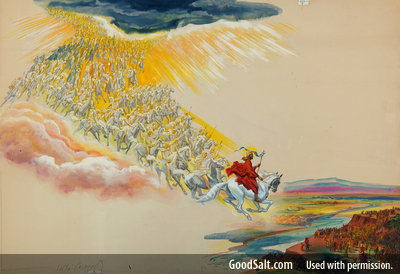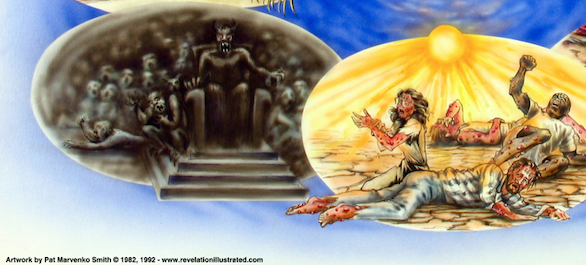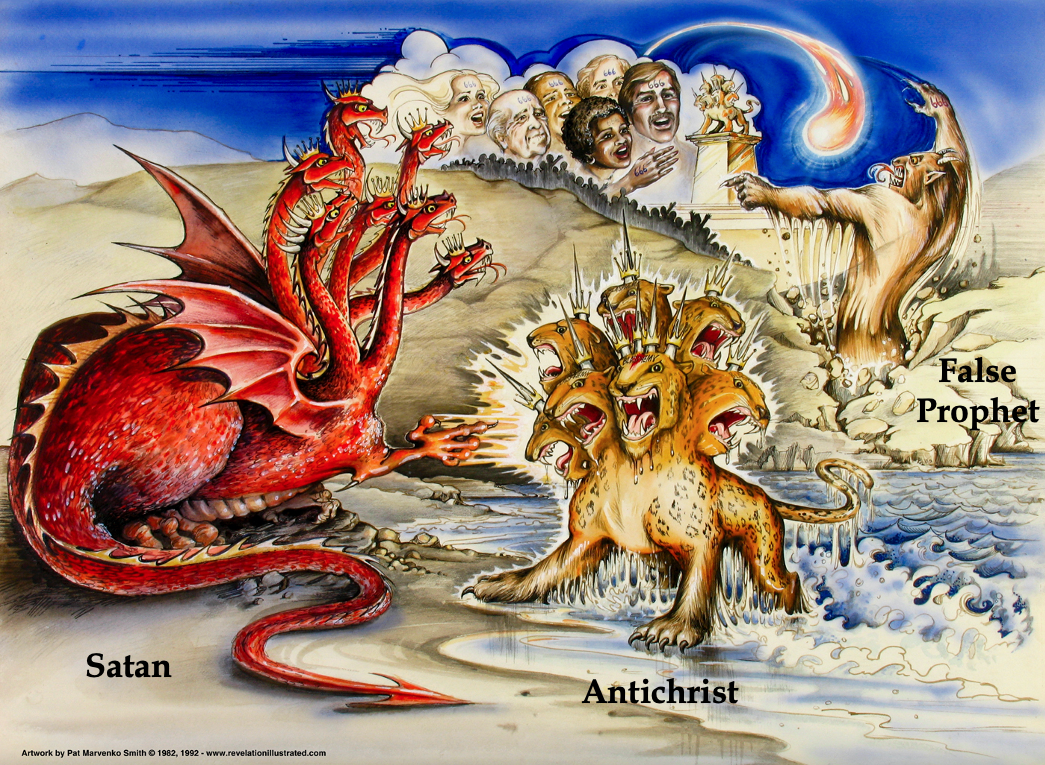“Then I saw another beast coming up out of the earth, and he had two horns like a lamb and spoke like a dragon.” Revelation 13:11
When Jesus spoke on the Mount of Olives of the sign of His coming to earth to set up His Millennial Kingdom, He described the future seven-year Tribulation period in Matthew 24:4-26. After expounding upon the first half three and a half years of the Tribulation period containing worldwide deception and agony (24:4-8), Christ then focused on the last three and a half years which would be characterized by even more deception and pain (24:9-26). He said, “11 Then many false prophets will rise up and deceive many… 23 Then if anyone says to you, ‘Look, here is the Christ!’ or ‘There!’ do not believe it. 24 For false christs and false prophets will rise and show great signs and wonders to deceive, if possible, even the elect. 25 See, I have told you beforehand.” (Matthew 24:11, 23-25).
Christ is warning His audience that “false christs” and those who announce them, “false prophets, will rise up and deceive many” by showing “great signs and wonders to deceive, if possible, even the elect” chosen people of God who are believing Jews living during the last half of the Tribulation period (24:24). Christ shares this “beforehand” to prevent His people from being deceived by satanically inspired teaching that misleads people away from the true God. In our study of Revelation today, the apostle John describes the ultimate fulfillment of Jesus’ prophetic words.
After seeing the vision of a beast coming up out of the sea representing the Antichrist (Revelation 13:1-10), John now sees a second beast. “Then I saw another beast coming up out of the earth, and he had two horns like a lamb and spoke like a dragon.” (Revelation 13:11). John saw “another beast” of the same kind come “up out of the earth.” Both men are called beasts to emphasize their cruel and vicious natures. 1 The word “earth” (gēs) literally means “land” and is most likely a reference to the land of Israel. 2 So, in contrast with the first beast who was a Gentile (from the sea; cf. 17:15; Isaiah 60:3-5; Daniel 7:2-4, 17; Matthew 13:47-50), we see that this beast may be a Jew (cf. 1:7). In view of the endless conflict between Arabs and Jews, this is a masterful arrangement by Satan himself. The union of an Arab (first beast) and a Jew (second beast) to lead the world into political, economic, and religious harmony is an ingenious answer to the world’s problems. 3
We learn that this second beast “had two horns like a lamb,” depicting his humble and gentle conduct. No one is afraid of a harmless “lamb.” But his speech will reveal his true character (13:11b; cf. Matthew 12:33-37). He will speak “like a dragon,” promoting Satan’s teaching that the first beast is God (13:11c; cf. 2 Thessalonians 2:4). He will be the Devil’s mouthpiece speaking lies to persuade the world to worship the World Ruler. No wonder God refers to this second beast three times in the book of Revelation as the “false prophet” (Revelation 16:13; 19:20; 20:10).
The deceptive and deadly approach of the second beast is summarized well by John Phillips: “The dynamic appeal of the false prophet will lie in his skill in combining political expediency with religious passion, self-interest with benevolent philanthropy, lofty sentiment with blatant sophistry, moral platitude with unbridled self-indulgence. His arguments will be subtle, convincing, and appealing. His oratory will be hypnotic, for he will be able to move the masses to tears or whip them into a frenzy…. His deadly appeal will lie in the fact that what he says will sound so right, so sensible, so exactly what unregenerated men have always wanted to hear.” 4
This second beast “is the final person in the unholy trinity of the end times (Revelation 16:13; 19:20-20:2, 10). Just as the Holy Spirit gives glory to Christ and points men to Him, the false prophet will glorify the Antichrist and lead people to trust and worship him.” 5
“As Donald Grey Barnhouse says, ‘The devil is making his last and greatest effort, a furious effort, to gain power and establish his kingdom upon the earth. He knows nothing better than to imitate God. Since God has succeeded by means of an incarnation and then by means of the work of the Holy Spirit, the devil will work by means of an incarnation in Antichrist and by the unholy spirit.’” 6
“In hell’s trinity, Satan is a counterfeit Father (antiFather), the Antichrist is a counterfeit Son (antiChrist), and the false prophet is a counterfeit of the Holy Spirit (anti-Spirit). This is the infernal trinity.” 7
Whereas the first beast will primarily be a military and political figure, the second beast will primarily be a religious figure who prepares the way for the World Ruler, much like John the Baptist prepared the way for Jesus, the Messiah (cf. John 1:6-9, 19-36; Acts 19:4). The apostle John writes, “And he exercises all the authority of the first beast in his presence, and causes the earth and those who dwell in it to worship the first beast, whose deadly wound was healed.” (Revelation 13:12). This false prophet will have worldwide “authority” to cause all unsaved people “who dwell” on the earth to “worship the first beast” who died and rose from the dead (“whose deadly wound was healed”). “Like Joseph Goebbels with Hitler, the false prophet will be inspired by the same authority and will share the same diabolical agenda as the Antichrist.” 8
Commenting on this verse, Tony Evans says, “This second beast, the false prophet, completes the unholy trinity, which imitates the work of the Holy Trinity. Within the Godhead, the Father seeks worship; the Son gives glory to the Father; and the Holy Spirit gives glory to the Son. Here, Satan seeks worship for himself; the first beast glorifies Satan; and the second beast compels the earth and those who live on it to worship the first beast. Additionally, he will heal the Antichrist’s fatal wound, imitating the Holy Spirit’s work of raising Christ from the dead (see Romans 8:11).“ 9
How exactly does the false prophet deceive the unsaved world to worship the Antichrist? The same way Jesus predicted he would (cf. Matthew 24:23-24). “13 He performs great signs, so that he even makes fire come down from heaven on the earth in the sight of men. 14 And he deceives my own people who dwell on the earth by those signs which he was granted to do in the sight of the beast, telling those who dwell on the earth to make an image to the beast who was wounded by the sword and lived.” (Revelation 13:13-14). Like Pharaoh’s magicians, only with greater effectiveness, the second beast will have authority to perform supernatural miracles (cf. Exodus 7:11, 22; 8:7). These will be genuine “great signs” or supernatural wonders, not just tricks (13:13a; cf. Revelation 16:13-14; 19:20; Matthew 24:4-5, 11, 23-25; 2 Thessalonians 2:9). 10 God is not the only One who can do supernatural miracles. Satan can also perform miracles, and he uses this power to deceive people to worship his substitute for Christ, the Antichrist.
One of his great miracles will be making “fire come down from heaven on the earth in the sight of men” (13:13b). Even the apostle John himself had at one time wanted to “command fire to come down from heaven” on some Samaritans who rejected Jesus (Luke 9:54). 11 Now John sees the false prophet calling fire down to the earth to deceive people into rejecting the true Christ in favor of Satan’s Antichrist.
As Christ predicted (cf. Matthew 24:24), even God’s own “elect” covenant people, Israel (“my own people who dwell on the earth”) will be deceived by these miraculous “signs” that the false prophet performs, the greatest of which was raising the Antichrist from the dead (“the beast who was wounded by the sword and lived”) after he had been fatally wounded (13:14; cf. 13:3; 17:8). As we mentioned in a previous lesson, by mimicking Jesus’ death and resurrection, Satan is attempting to persuade the nation of Israel to believe that the Antichrist is their long-awaited messiah so he can lead them to eternal destruction with him in the lake of fire (Revelation 19:20; 20:10, 15), thus rendering God’s promises to Israel false and making God a liar.
Those who are deceived by the False Prophet will be instructed to build “an image to” honor “the beast” who died and supernaturally came back to life (13:14b). This fulfills Jesus prophetic teaching on the Mount of Olives when He said, “Therefore when you see the ‘abomination of desolation,’ spoken of by Daniel the prophet, standing in the holy place (whoever reads, let him understand).” (Matthew 24:15). The “image” or statue in honor of the beast (13:14b) is the “abomination of desolation” that will be placed in the rebuilt Jewish temple in Jerusalem at the midpoint of the Tribulation period.
Like the image of Nebuchadnezzar on the plain of Dura (Daniel 3), everyone must bow to this image or die. 12 “He was granted power to give breath to the image of the beast, that the image of the beast should both speak and cause as many as would not worship the image of the beast to be killed.” (Revelation 13:15). This image or statue will be unlike any ever created. This inanimate object will become animated. The false prophet will “give breath to the image of the beast” so that “the image of the beast” will come to life and “speak” (13:15a).
People have come up with many theories about this “image of the beast.” Some suggest that since Satan does not have the power to give life to an inanimate object, he only gives this image the “impression of breathing and speaking mechanically, like computerized robots today.” 13 “When the television set first came on the scene, some people thought that might be the image of the Beast. People made the same suggestion about computers connected to the Internet. Some folks, bewitched by sci-fi movies, tossed around the idea that the image might be a supercomputer that gains consciousness – or a 3-D hologram – or a subhuman clone of the Antichrist.” 14
I prefer to take the biblical text literally. The Greek word for “image” (eikona) means “an object shaped to resemble the form or appearance of something, likeness.” 15 The image of the beast will not be a robot, or a clone, or a supercomputer, it will be some type of idol that visually represents the Antichrist. 16 It is likely that Satan and his demons will indwell or possess the idol to be the direct recipients of the world’s worship. This should not surprise us. Throughout history, demons have attached themselves to idols so that when people worship an idol, the demons can receive the adoration and worship that they long for. 17
For example, the apostle Paul writes to Christians at Corinth who were not only participating in the Lord’s Supper with believers at church, but they were also eating with unbelievers who sacrificed to idols in pagan temples. Paul says to them, “14 Therefore, my beloved, flee from idolatry… 19 What am I saying then? That an idol is anything, or what is offered to idols is anything? 20 Rather, that the things which the Gentiles sacrifice they sacrifice to demons and not to God, and I do not want you to have fellowship with demons.” (cf. 1 Corinthians 10:14, 19-20). A sacrifice that was offered to a false god, was actually being offered to a demon (cf. Leviticus 17:7; Deuteronomy 32:16-17; 2 Chronicles 11:15; Psalm 106:36-38; Revelation 9:20).
Anyone who refuses to “worship the image of the beast” will be “killed” by it (13:15b). Believers worship Christ because He rose from the dead (cf. Acts 17:30-31), and unbelievers will worship the beast because he will have done a similar thing (13:14-15).
Many people during the last half of the Tribulation will assume a person who can give life to a statue must be a divine person, but the Bible teaches otherwise. Just because someone can work a miracle doesn’t make him worthy to be followed or worshiped. God does miracles in a righteous way and in accordance with biblical truth. Even if someone can call down fire from heaven and raise the dead, he is working for Satan if he does not point people to the Lord Jesus Christ. 18
In view of Satanic deception (Revelation 13:11-15), believers must always test what teachers say against God’s Word no matter how godly and persuasive they may appear (cf. I Thessalonians 5:21; I John 4:1-3). For example, Jesus warned, “Beware of false prophets, who come to you in sheep’s clothing, but inwardly they are ravenous wolves.” (Matthew 7:15). Like the False Prophet of Revelation 13, Jesus says false prophets today will look like genuine believers (“come to you in sheep’s clothing”).
They will even confess the Lordship of Christ. Christ says of them, “21 Not everyone who says to Me, ‘Lord, Lord,’ shall enter the kingdom of heaven, but he who does the will of My Father in heaven. 22 Many will say to Me in that day, ‘Lord, Lord, have we not prophesied in Your name, cast out demons in Your name, and done many wonders in Your name?’ 23 And then I will declare to them, ‘I never knew you; depart from Me, you who practice lawlessness!’” (Matthew 7:21-23). They confess the Lordship of Jesus Christ by referring to Him as “Lord, Lord.” These are people who have some understanding of the greatness of the Person of Christ. They sincerely believe Jesus is “Lord,” that is, Master, Ruler, and King. Because of this belief, they look like followers of Christ outwardly and do wonderful works for His glory – prophesy in His name, cast out demons in His name, and do many wonders in His name (7:22), but inwardly they are “ravenous wolves” (7:15). Christ says they will not be in heaven (7:23).
Like the False Prophet of Revelation 13, these modern-day false prophets exhibit great power. They will claim to have “prophesied… cast out demons… and done many wonders in” in Jesus’ name (7:22b). Notice that Jesus does not deny their claim. These people wanted Jesus to get the glory by doing these incredible things in His name. They want the glory to go to the Lord, not themselves. These are all things that Jesus did. These false prophets appeal to Jesus to let them into the kingdom of heaven based on their Christ-like works. Even though they openly confessed the Lordship of Christ and did wonderful works for His glory, look at what Jesus says about them: “I never knew you; depart from Me, you who practice lawlessness” (7:23). Christ refers to their religious works as “lawlessness.” All sin is lawlessness (I John 3:4). Even sin that looks good on the outside is lawless before a holy God because it is not done in the context of a saving relationship with Jesus Christ.
Jesus explains that we will know these false prophets by their words, not their works: “16 You will know them by their fruits. Do men gather grapes from thornbushes or figs from thistles? 17 Even so, every good tree bears good fruit, but a bad tree bears bad fruit. 18 A good tree cannot bear bad fruit, nor can a bad tree bear good fruit. 19 Every tree that does not bear good fruit is cut down and thrown into the fire. 20 Therefore by their fruits you will know them.” (Matthew 7:16-20). The way to discern if they are false prophets is by their “fruits.” Since the Lord has just told us that these false prophets look like sheep, we can conclude that their “fruits” have nothing to do with outside appearances.
Jesus helps us understand that their “fruits” refer to their words, not their works in Matthew 12:33-37 where He uses the same imagery. “33 Either make the tree good and its fruit good, or else make the tree bad and its fruit bad; for a tree is known by its fruit. 34 Brood of vipers! How can you, being evil, speak good things? For out of the abundance of the heart the mouth speaks. 35 A good man out of the good treasure of his heart brings forth good things, and an evil man out of the evil treasure brings forth evil things. 36 But I say to you that for every idle word men may speak, they will give account of it in the day of judgment. 37 For by your words you will be justified, and by your words you will be condemned.” Just as “fruit” reveals the nature of a “tree,” so one’s “words” reveal the nature of one’s “heart.” What the “heart” is filled with (“abundance of the heart”) and values the most (“treasure of his heart”) cannot be concealed. The “mouth speaks” what is in a person’s “heart.” The “words” that a false prophet “speaks” are windows into his “heart.” So, the way to discern a false prophet is by listening to his message.
Jesus said if you want to “enter the kingdom of heaven,” you must do “the will” of His “Father in heaven” (Matthew 7:21). What is the Father’s will as it relates to entering His heaven? Jesus said, “And this is the will of Him who sent Me, that everyone who sees the Son and believes in Him may have everlasting life; and I will raise him up at the last day.” (John 6:40; cf. John 3:5-16). The will of God the Father as it relates to entering the kingdom of heaven is to believe in His Son, Jesus Christ, for eternal life. Anyone who teaches a different way to heaven is a false prophet or teacher.
In the context of Matthew 7, true prophets are standing in front of the “narrow gate” that “leads to life” (Matthew 7:13-14). They are preaching that the way that “leads to life” eternal is “narrow” (John 10:9; 14:6; cf. Acts 4:10-12). Only believing in Jesus Christ alone leads to eternal life (Matthew 21:31-32; cf. John 3:16; 6:40, 47).
However, false prophets are standing in front of the “wide” gate that “leads to destruction” (Matthew 7:13-14). These false prophets are preaching many ways to heaven except faith alone in Christ alone. Those who believe the false prophet’s message and never believe Christ alone for eternal life, will be surprised in the day of judgment when the Lord Jesus says to them, “I never knew you; depart from Me, you who practice lawlessness” (Matthew 7:23)!
It doesn’t matter what you have said or done, because you are still a sinner and need a Savior to take away your sins. Your words and works cannot take away your sins. This is why Jesus said these false prophets practiced “lawlessness” (Matthew 7:23). They were relying on their sin-stained words and works to get them to heaven (Isaiah 64:6), instead of the finished work of Jesus Christ (John 3:14-15; 19:30). Only Jesus can take away our sins because He is God and took our place and punishment for sin when He died as our Substitute on the cross and rose from the dead (John 1:1, 14, 17; I Corinthians 15:3-6). When it comes to getting to heaven, it is not the will of God that you confess the Lordship of Christ, or surrender to the Lordship of Christ, or do good works for His glory. It is the will of God that you believe in Christ alone for His gift of eternal life (John 3:14-16; 6:40).
Prayer: Gracious heavenly Father, thank You for Jesus’ warnings about false christs and prophets who will try to mislead us away from the truth about Christ with the use of their persuasive words and profound works. Thank You, Father, for giving us Your word so we may know the truth which can set us free from Satan’s lies. We need Your spiritual discernment, Father, especially in an age of deception and manipulation so we are not led away from You and Your Son, Jesus Christ. May Your Word have such deep roots in our hearts and minds that we can easily identify and avoid a false prophet who stands in front of the wide gate that leads into eternal destruction. Please enable us to clearly communicate the gospel of grace so unsaved people can know and believe that Jesus Christ alone is able to save them and give them everlasting life the moment they believe in Him. We ask Your Holy Spirit to open the spiritual eyes of those who have been blinded by Satan’s deceit so they can realize that the Jesus of the Bible is the only Savior Who can rescue them from the lake of fire and give them an eternal home in Your heaven. In the matchless name of Jesus Christ, we pray. Amen.
ENDNOTES:
1. Mark Hitchcock, The End: A Complete Overview of Bible Prophecy and the End of Days (Carol Stream, IL: Tyndale House Publishers, Inc., 2012 Kindle Edition), pg. 269.
2. Bob Vacendak; Robert Wilkin; J. Bond; Gary Derickson; Brad Doskocil; Zane Hodges; Dwight Hunt; Shawn Leach, The Grace New Testament Commentary: Revised Edition (Grace Evangelical Society, Kindle Edition, 2019), pg. 1547; J. Dwight Pentecost, Things to Come (Zondervan Academic, 2010 Kindle Edition), pg. 333; Tony Evans, CSB Bibles by Holman, The Tony Evans Study Commentary (B & H Publishing Group, Kindle Edition 2019), pg. 2401.
3. Vacendak, pg. 1547.
4. Hitchcock, pg. 272 cites John Phillips, Exploring Revelation (Neptune, NJ: Loizeaux Brothers, 1991), pg. 171.
5. Hitchcock, pg. 270.
6. Ibid., cites Donald Grey Barnhouse, Revelation: An Expository Commentary (Grand Rapids: Zondervan, 1971), pg. 240.
7. Ibid., pp. 270-271.
8. Ibid., pg. 273.
9. Evans, pg. 2401.
10. Tom Constable, Notes on Revelation, 2017 Edition, pg. 148 cites Gregory H. Harris, “Satan’s Deceptive Miracles in the Tribulation,” Bibliotheca Sacra 156:623 (July September 1999): 308-324.
11. Constable, pg. 148.
12. Hitchcock, pg. 274. F
13. John F. Walvoord, The Bible Knowledge Commentary Epistles and Prophecy, Editors John F. Walvoord and Roy B. Zuck (David C. Cook, 2018 Kindle Edition), locations 5820 to 5825.
14. Charles R. Swindoll, Insights on Revelation (Swindoll’s Living Insights New Testament Commentary Book 15, Tyndale House Publishers, Inc., 2014 Kindle Edition), pg. 253.
15. Walter Bauer, A Greek-English Lexicon of the New Testament and Other Early Christian Literature: Third Edition (BDAG) revised and edited by Frederick William Danker (Chicago: University of Chicago Press, 2000 Kindle Edition), pg. 281.
16. Swindoll, pg. 253.
17. Ibid.
18. Evans, pg. 2401.











